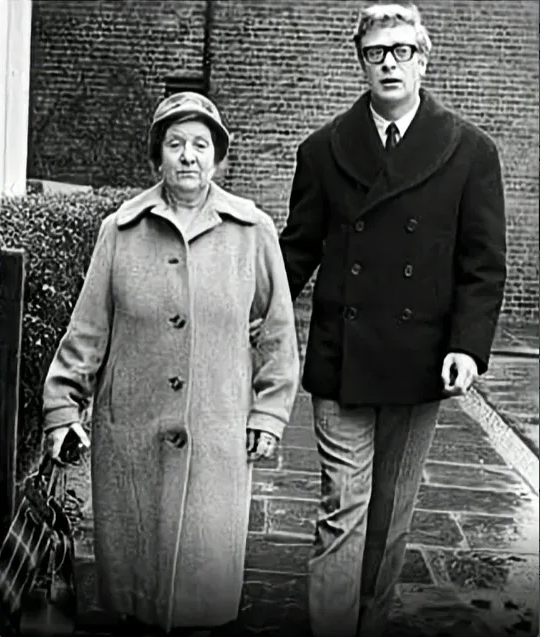
Ellen worked as a cleaning lady in South London, her hands worn from scrubbing floors to feed her boys. It was hard work that paid little, the kind of labor that leaves you exhausted at the end of every day with barely enough to show for it. But she did it without complaint because her children needed to eat.
Her son Michael never forgot.
By the late 1960s, Michael Caine had become a star. The Cockney kid from South London was now a celebrated actor, his face on movie posters, his name in credits, his career ascending in ways that would have seemed impossible just years earlier.
When Ellen asked what he earned for a film, Michael told her: “A million pounds.”
She asked softly, almost unable to grasp it: “How much is that, love?”
She was truly unable to comprehend the number. It meant nothing to her in practical terms because she’d spent her entire life thinking in terms of daily wages, weekly grocery budgets, small amounts stretched as far as possible. A million pounds wasn’t real money—it was an abstraction, a number too large to connect to the reality of buying bread or paying rent.
Michael’s response is beautiful in its simplicity: “It means you will never have to work again, Mum. He bought her a home, and Ellen’s later years held comfort and love.”
The black and white photo shows them together—Ellen in a modest coat and hat, looking like exactly what she was: a working-class woman who’d spent her life in service labor. Michael beside her in a sharp peacoat, tall and handsome, looking every inch the movie star he’d become. They’re walking together, and despite the obvious difference in their current circumstances, the bond between them is evident.
This story captures something profound about success and family and remembering where you came from. Michael Caine could have become the kind of star who forgets his humble origins, who’s embarrassed by his working-class roots, who distances himself from the mother who scrubbed floors.
Instead, he used his success to give her the one thing she’d never had: security. The knowledge that she’d never have to scrub another floor unless she wanted to. The comfort of knowing her son had made it, and his success meant her struggles were finally over.
“How much is that, love?” isn’t just a question about money. It’s a window into how differently they’d experienced the world. Ellen thought in pounds and pence, in daily wages and careful budgeting. Michael now thought in amounts that would have seemed fictional to the woman who raised him.
But he never forgot what those worn hands had done for him. Never forgot that every floor his mother scrubbed was for him. Never forgot that her exhaustion paid for his childhood, gave him the foundation to become who he became.
So when he could, he bought her a home. Gave her comfort. Made sure her later years held love instead of labor.
Ellen’s hands were worn from scrubbing floors to feed her boys. Michael Caine made sure she never had to scrub another one.
That’s not just success. That’s remembering. That’s gratitude. That’s using your good fortune to honor the person who sacrificed so you could have a chance.
The photo shows them as they were—the cleaning lady and the movie star, mother and son, two people whose lives look nothing alike but whose love for each other transcends every difference in circumstance.
Michael Caine has had a remarkable career spanning decades. But this might be his most important role: the son who never forgot his mother’s worn hands, and who used his success to give her rest.